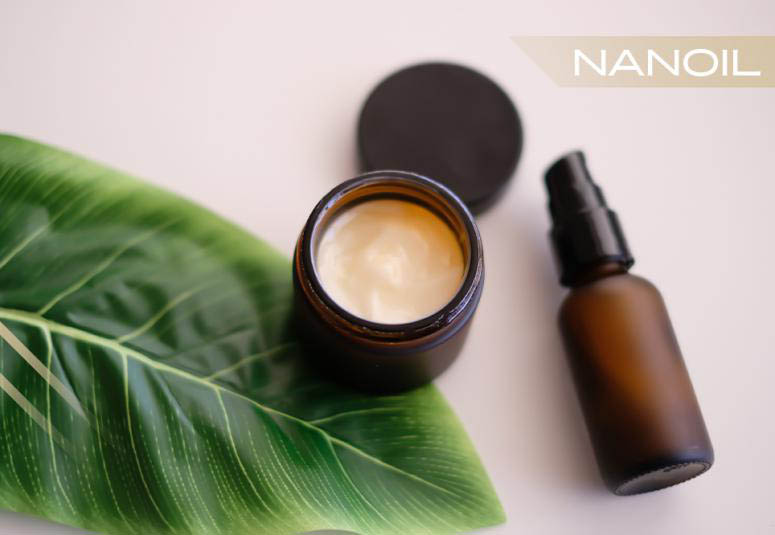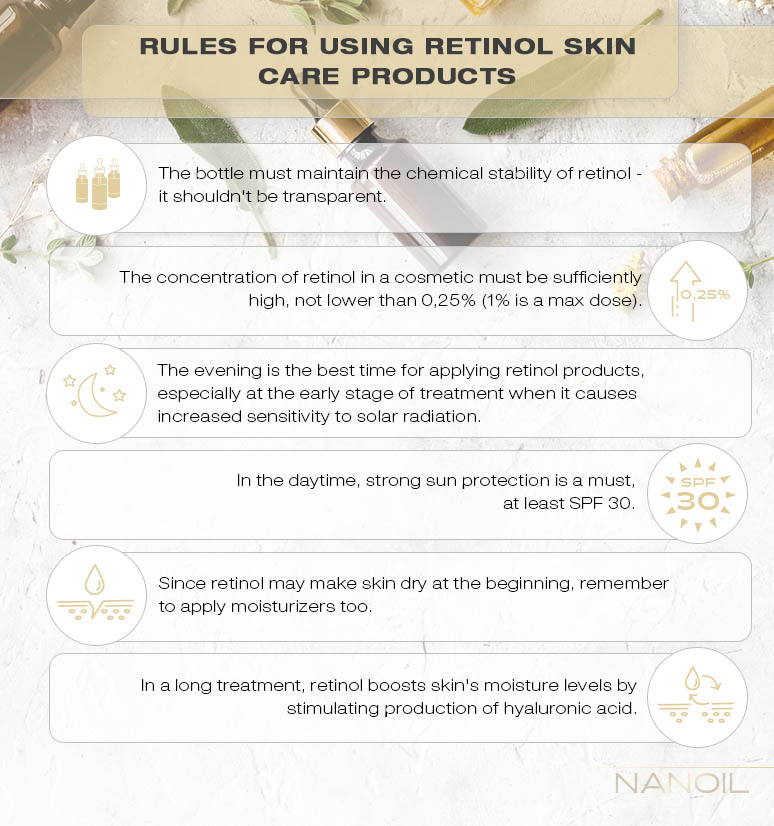- NANOIL Products
- Oils
- Face serums
- Hair masks
- Shampoos
- Hair conditioners
- Hair styling
- Hair Porosity Test
- Blog
- Contact

Marvelous retinol, the only cosmetic ingredient so effective in antiaging routine. It is both miracle-working and dangerous, attracts women wanting to stop the clock and smooth out wrinkles yet it's not the only purpose of retinol. This thoroughly-tested ingredient has a far wider range of effects. Check the specifics and learn how to use it so that you never ever repeat the myth that retinol causes damage to skin.
It's simply a pure form of vitamin A. Its antiaging effect has been proven scientifically. Retinol stimulates cells to repair like no other substance. Moreover, it has been tested most thoroughly out of all ingredients used in cosmetics. It has a strong antiaging effect and strikingly rejuvenates skin, smoothing even deep furrows. In food it is mostly present in fish oil, butter, egg yolk, carrots, citrus fruit and green vegetables. In order to intensify its effect on skin, supplementation is not enough. We should use the right retinol-infused skin care products.
Don’t let the intro to the post mislead you - retinol isn't designed exclusively for mature, aging skin. It has a much wider range of effects and uses. Let's remember that the level of collagen and elastin starts dropping once we turn 25 so we should introduce retinol to skin care by our thirties. If you've spotted deepening expression lines, acne breakouts, pigmentation spots or uneven skin tone, retinol is going to be your ally when fighting for flawless skin.
Vitamin A is produced by our bodies from beta-carotene and fulfils an important function, namely, forms and stimulates skin cells to grow, and thus helps delay aging process. Too bad the amount of this vitamin of youth in the body drops and not just as a consequence of aging. The harmful effect of ultraviolet radiation is to be blamed too. To make things worse, smaller amounts of vitamin A translate to worse appearance of the skin: dry, flaky skin is the first symptom of its deficiency. With time, the skin has less collagen and elastin. Vitamin A helps to maintain their sufficient levels.
Retinol makes us think mostly of rejuvenating and anti-wrinkle effect, plus retinol products are mostly dedicated to aging skin. However, it does have much more uses.
Retinol increases the activity of enzymes and normalizes keratinization, in other words, it accelerates the process of creation of new cells and greatly improves the "quality" of the skin (acne, psoriasis, photoaging). Moreover, it brightens pigmentation spots by regulating melanocytes.

There are lots of chemical compounds under the name of vitamin A. For example, its derivatives are common and they have biological activity characteristic for vitamin A. Contrary to vitamin C which is best in its stable form, not as a pure ascorbic acid, vitamin A's most expensive, pure form is the most effective. Other substances belong to retinoids, that is substances which have the activity typical of vitamin A.
RETINOL is a pure form of vitamin A commonly added to cosmetics. The proper concentration and formula of vitamin A turns into retinoic acid in skin cells, displaying high effectiveness and not irritating the skin like other retinoids do.
Retinol is a natural retinoid and is the precursor to retinoic acid and retinene. It has a multidimensional effect, smoothes out skin, reduces pigmentation spots, contributes to increased number of collagen fibers which iron out wrinkles.
RETINOID is a new, cosmetic, synthetic generation of vitamin A. It is an ester derivative of retinoic acid, highly stable and effective. Retinoid is the only one to be used in cosmetics these days since it doesn't have an irritative effect on skin, which is common in case of prescribed retinoids. Below we present the most popular retinoids.
Retinol and retinoids are two different things. Before getting a retinol product, check through INCI. Retinol is the best form of vitamin A for skin, its purest form. It's the most effective and best absorbed by the skin.
Many cosmetic brands like to put vitamin A on the label and chemical compounds inside - they are biologically active yet they are not retinol. They are known as retinoids and often trigger skin irritations. Always check products for retinol.
Which form of retinol is the best?
Ideally, you should use a clear, fragrance-free retinol-rich oil since it's fat-soluble. Searching for the best retinol skin product? Reach for oil serum: fats, or natural oils, stabilize retinol and facilitate absorption. Serum is also a great formula transporting retinol deep inside the skin, deeper than a moisturizer would.
Vitamin A preserves its qualities longer when captured in oil particles inside a dark bottle.
Natural oils always make a good choice. They are rich in vitamins, including vitamin A, often together with vitamins C and E, as well as essential unsaturated fatty acids. The largest amount of vitamins can be found in an oil of seven vitamins (A-B-D-E-H-K-PP): Nanoil Avocado Oil. It is unrefined and cold-pressed and thus makes up a treasure trove of natural skin and hair-enhancing substances.
Even though it has a wonderful effect, retinol might initially leave the skin very dry or even cause irritations. Hence the common belief that retinol causes allergic reactions and doesn’t make a good pick for all of us. This is actually a misconception and all you need to remember about is use it the right way to avoid unpleasant consequences for the skin. How to get round to it?
Ideally you should observe the skin after the first uses and tailor the frequency of application accordingly. Retinol products can be used on a daily basis, however, if you're a beginner, take 3-day breaks to let the skin get used to the new ingredient. Then, gradually increase the dose - this process is called retinization and gives the skin a chance for acclimatization.
Another must-know piece of information is that flaky skin is a normal symptom at the beginning of retinol treatment. Thanks to that we get rid of old, callused epidermis which in turn gives birth to “new” skin. That's why when using retinol serum it's essential to use sunscreen, at least SPF 30, ideally SPF 50, in order to protect the skin against the sunlight.
The concentration of retinol determines its intensity and force so let's start with small doses and gradually move on to products with a higher retinol content.
Leave your email address and we ll notify you when it s back in stock.
Comments: #0